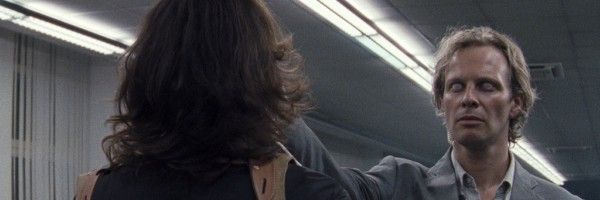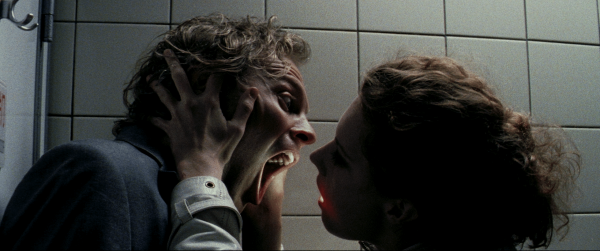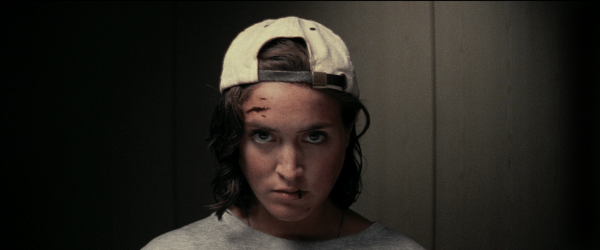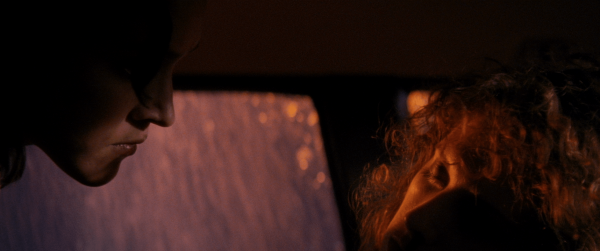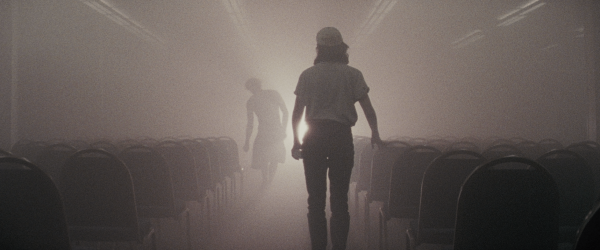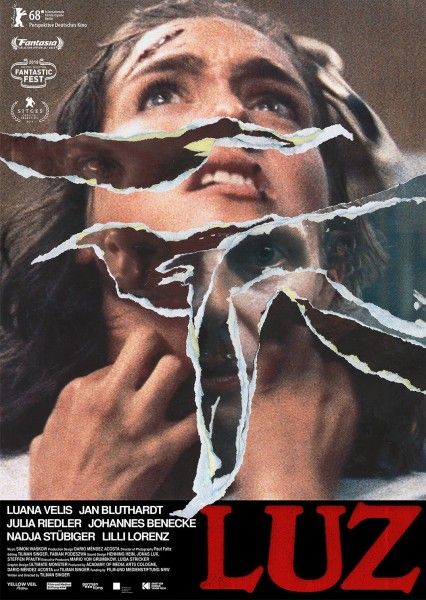There's no shortage of demonic possession movies out there, but you've never seen one quite like Luz. The directorial debut from Tilman Singer is trim, tense, and strangely sexy spin on the subgenre that takes bold strides in style and staging without losing the thread of its surreal journey into the dark unknown.
Moody, and stylish from the first frames to the last, Luz follows Luana Velis as the title character, a woman from Chile working as a cabbie in Germany. Bloody and bruised from an accident, Luz wanders into a quiet, run-down police station for help. What follows is a strange amalgamation of Luz's rebellious past at Catholoic school, the accident itself, and the investigation process that follows, which hinges on a bizarre hypnotherapy investigation and only gets weirder from there.
Local detective Bertillon (Nadja Stübiger) takes charge of the investigation with psychiatrist Dr. Rossini (Jan Bluthardt) doing the hypnotizing and questioning, and the increasingly unnerved Olarte (Johannes Benecke) handling translation and recordings while locked away in his sound booth. Once Luz is under hypnosis, they ask her to recreate the events of the accident in the hopes of discovering what happened to missing passenger Nora (Julia Riedler), but they dig up a mystery much larger, darker, and yes, demonic than they were expecting.
Of course, nothing in Luz is this straightforward on the screen. It's a slow film, sometimes too slow, and there's a lot that's left intentionally vague. Some may find that putting the pieces of Singer's puzzle together is ultimately too challenging or too demanding to satisfy, but the debut filmmaker makes sure that the pieces are there -- and they are damn beautiful -- if you want to play along.
The film's unusual structure makes a perfect example. The action is spectacularly staged and blocked in a way that transforms the production's minimal means into a world that feels whole. The pieces of Singer's puzzle are spread out across three pivotal sequences that take the audience on a journey through time and location, using the power of suggestion and human imagination to turn austere interiors into a world out of space and time, where the mysteries of Luz and the demon who loves her unfold in non-linear, overlapping tales of possession and obsession.
Before we even get to the proper investigation, we meet Dr. Rossini in a bar, where he waits for his pager to beckon him to the station. What? A pager? Indeed, It's not clear when exactly Luz is set. The blocky, textural fashion (especially Luz's backwards hat) and the near brick-sized pager point to somewhere in the 80s or 90s, while the grainy 16 mm cinematography and lush use of shadow and color calls back to Euro horror of the 60s and 70s.
Suffice it to say, Luz takes place in a time that's not now and a place that's not here, where Dr. Rossini meets a mysterious woman in a bar, who plies him with fancy color-changing cocktails (a particularly brilliant otherworldly flourish), and regales him with stories of a girl named... you guessed it, Luz... who she loved back in Catholic school. The two share drinks, drugs, and a strange connection. From that encounter, Dr. Rossini makes his way to the investigation, and from there.... well you'll have to decide for yourself when you see the foggy nightmares and hellish visions that Luz brings to bear in its thrilling, if occasionally confounding third act.
All told, Luz makes for a fascinating and engrossing bit of possession cinema, that uses the power of story structure and setting to tell an utterly unpredictable horror tale. It's a sensual, hellish vision of demonic obsession that's ambiguous and artsy without ever forgetting to be entertaining, tugging on primal lusts and fears to keep the blood flowing even when you might not exactly follow the flummoxing action. It's so competent and confident, it's almost impossible to believe Luz was first a thesis film, and it sure makes you curious to see what Singer will do next.
Rating: B+
Luz screened at Fantastic Fest 2018 and will next appear at Sitges International Fantastic Film Festival. The film does not yet have a release date.

